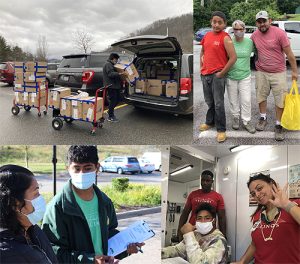The next phase of the COVID-19 approach needs to be focused on empowering individuals to make the best informed decisions to protect themselves, their families, and their communities
By Yolanda Pinzon Uribe
Community Health Program Manager
Vecinos
Nowadays, we hear a lot about “the next phase of COVID-19” and the “transition” away from the pandemic response; however many challenges still remain for our Western North Carolina (WNC) communities.
 When Vecinos began its COVID-19 response at the beginning of the pandemic, there was little information about the effects of the virus and potential treatments. We built our response capacity by strengthening relationships with our network partners in the region with the clear intention of facilitating access to information, testing and vaccinations for the most vulnerable communities in WNC, work that undoubtedly saved lives and prevented hospitalizations.
When Vecinos began its COVID-19 response at the beginning of the pandemic, there was little information about the effects of the virus and potential treatments. We built our response capacity by strengthening relationships with our network partners in the region with the clear intention of facilitating access to information, testing and vaccinations for the most vulnerable communities in WNC, work that undoubtedly saved lives and prevented hospitalizations.
That was and still is our “molded to deliver on the moment” response. However, we are no longer in the same place as last year, where the emergency was a “race against time.” Now, things have changed. We can say that the COVID-19 landscape looks different because we know more about the virus and have several effective tools that reduce the risk, as outlined in the NC Department of Health and Human Services’ recent “Moving Forward Together” document. Nevertheless, we need to keep our eyes open to quickly identify the next disease or virus that can be treated in a timely manner, and thus prevent possible future pandemics or at least mitigate their effects.
We know that the virus continues to transform and variants are appearing around the world. While we cannot predict the challenges these variants may bring, somehow we must return to normal.
Accessibility has been one of the most important things in this race. Increased access to services has made it easier for thousands of individuals – especially Hispanics, immigrants, and black communities that typically face barriers to healthcare – to find the vaccine and be tested as needed. We carried out community outreach through vaccination and testing drives, and also conducted door-to-door visits under the initiative, Mobile Clinic One by One All in One, in the seven most remote counties of WNC, touching thousands of people.

And now, we need to adapt our response, but it doesn’t mean that we need to take a step back. This pandemic has shown us two important things: First, we must work together and secondly, the services and assistance we provide must reach out into our communities. It is not enough to say “we have open doors for every one;” in order to prevent disease, we need to go into the communities and meet people where they are.
With this mission in mind, we continue working together with our local network partners and public health departments in a new phase designed to provide basic health services to our communities by doing screenings and identifying health risk factors. We intend to take the next step in our outreach strategy by doing health promotion and prevention to protect those most vulnerable to severe illness.
We can change the strategy, but we cannot slow down. We have to continue working hard to ensure equal access to information, basic health services, and treatment for historically marginalized communities
We are very excited to embark on this new chapter as we work to identify risks in our communities and provide attention and assistance to those in need.
